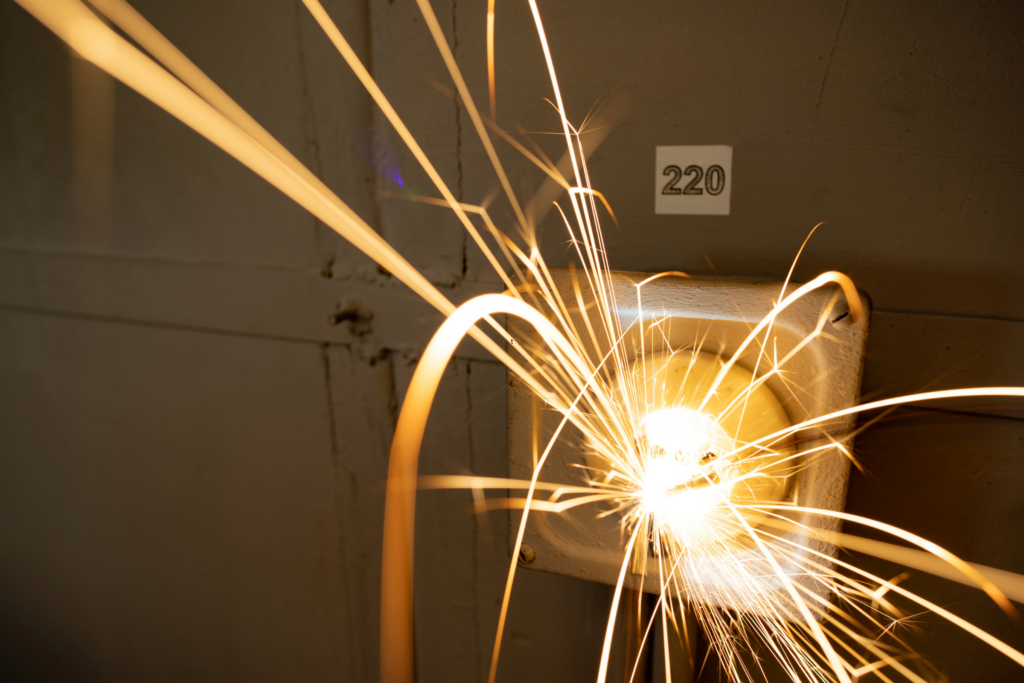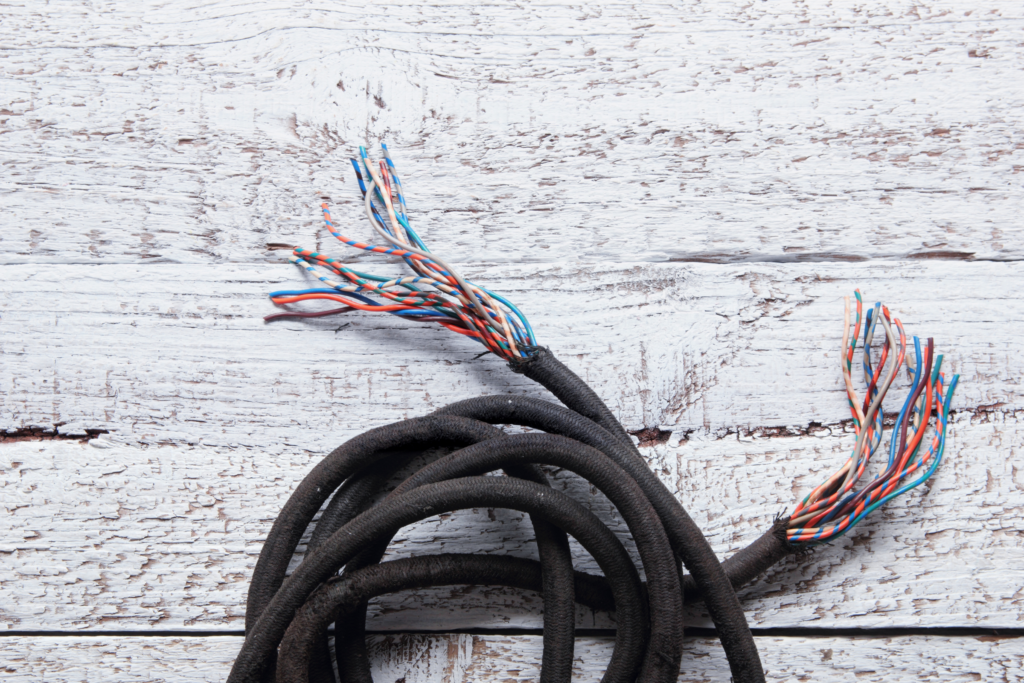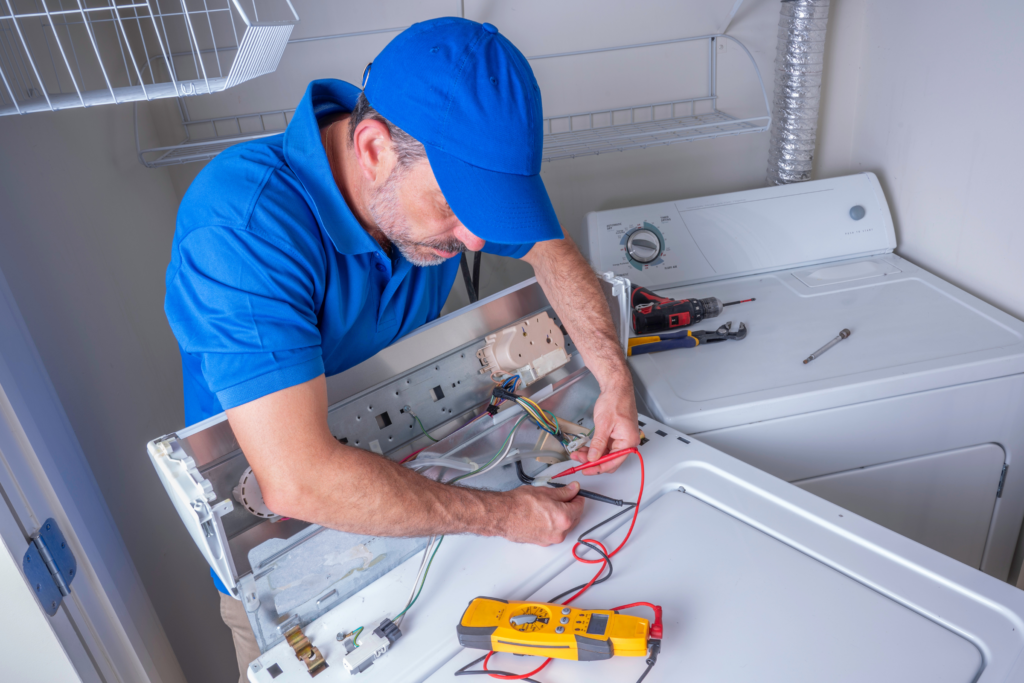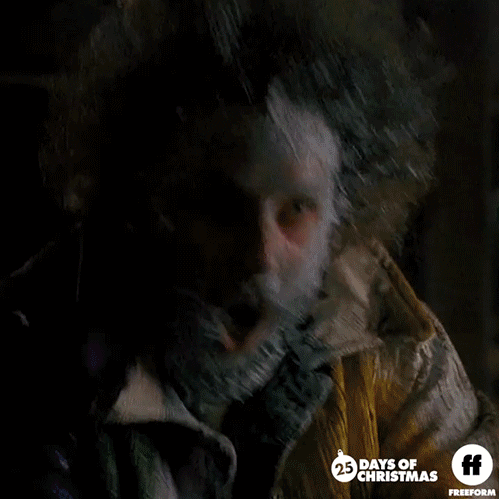Washing machine Sparks when Plugged in (5 common causes of electrical outlet sparks)
Appliances are an integral part of our everyday lives. Between kitchen appliances, washing machines, and dryers, they comprise many of our essential functions.
However, when they start to be finicky, it can cause real issues.
Say, for instance, your washing machine sparks when plugged in. Is this normal? Why is it doing that?
Small parks from plugging in your washing machine are typical; this occurs from the contact between the plug and the receptacle contacts in the outlet. However, large, noticeable sparks indicate that you are dealing with a short circuit, excessive moisture, or even loose connections in the cords.
Read to learn more about why sparks are normal and the most common causes of “bad” sparks when plugging your washing machine in.
Is an electrical outlet spark normal when plugging in your washing machine?
Sometimes, it can be hard to distinguish between what is expected and what isn’t. Those living alone for the first time might not know what to expect.
Is sparking normal when plugging in appliances like a washing machine?
Yes, brief sparks are normal when plugging in your washing machine. They occur due to the plug prongs making contact with the receptacle contacts. However, large sparks, several sparks, and crackling sounds are not normal; they indicate some electrical issue.
Washing machines receive power from being plugged into electrical sockets in the wall. These sockets carry alternating current, or AC, to the washing machine that powers the motor to agitate and wash the clothes.
To transfer AC from the outlet to the washing machine, the two components are connected by receptacles.
When first plugged in, the plug and receptacle typically create a brief spark from the transfer of electricity.
Large sparks, however, signal an issue with your electrical components, whether with the washing machine or the outlet itself.
Read on to learn about the common causes of large sparks associated with crackling.

5 common issues that cause an outlet to spark
Having distinguished between what normal sparks look like when compared to troublesome sparking, here are the five most common causes of sparking when plugging in your washing machine:
- Loose wire connection between washing machine and electrical outlet
- Wet outlet
- Short in the power cord
- Short in washing machine control board
- Overloaded electrical circuit
Loose wire connections between washing machine and outlet
Over time, wires loosen up from excessive use. Unfortunately, this can be a catalyst for issues.
A loose wire connection in the top plug or wall outlet can lead to sparks as a previously disconnected or loosely connected wire completes a connection when the plug is fitted in the receptacle.
A strong connection between the washing machine and the receptacles allows electricity to pass through without resistance.
When the connection becomes loose, electricity meets resistance and creates excessive heat.
If or when this happens, there’ll likely be a crackling noise and a burnt electrical smell.
Wet outlet (excessive moisture)
Moisture and electricity have never been friends, nor will they ever be!
Another possible cause of sparking is a wet outlet. This occurs because the presence of water exponentially increases the electrical current to the point that the circuit is overwhelmed.
Being that water is a conductor rather than an insulator, plugging your washing machine into a wet outlet can produce sparks and possibly fire.
You may smell burnt rubber as the sparks burn the rubber insulation. In extreme cases, the plug and or insulation can melt due to the sparking.
Check if the sparking is in the plug or cord or the outlet. Connect the washer plug to a different outlet and check if the sparking stops.
If there’s sparking with another outlet, the issue is likely with the plug; if the other outlet works fine, the original outlet is the root of your problems.
Short in the power cord
The integrity of your power cord is essential to a properly functioning washing machine. If compromised, it may be the cause of electrical sparking.
A damaged power cord with broken insulation from a cut or an object pressing against the cable can lead to sparking if there is an internal short.
Electricity always travels by the path of least resistance. Why do more work than necessary?
When a power cord is damaged from either a cut or mark, the electricity “short-circuits”; that is, there’s a new, shorter path to travel along.
This is problematic because the short circuit is often incapable of handling the amount of electricity flowing through it.
When this happens, there’s usually a burn mark on the power cord and a burnt insulation smell. Visible sparks and even a fire can occur.

Short in the washing machine control board
Often, the problem can be found within the washing machine.
Similar to how the power cord can short, the washing machine control board can also short-circuit. This happens due to an old or damaged component on the control board.
A loud pop sound and visible sparks can characterize short-circuits in the washing machine control board.
It can be caused by a component failure on the washer control board or if the board has been exposed to water.

Overloaded electrical circuit
Just as I have, I’m sure you’ve plugged way too many things into one circuit at one time or another.
Sparks can stem from an overloaded electrical circuit. When the circuit is pushed beyond its capacity to handle the current, it can result in sparks.
Common symptoms of an overloaded outlet include but are not limited to frequent trips, outlets that are warm to the touch, and the burning smell of scorched rubber.
Old outlets are especially prone to overloading; if you live in an older house, consider redistributing where your appliances are plugged in to balance the load.
Luckily, this is the simplest of today’s issues to fix. Try plugging the washing machine into another outlet to avoid tripping the circuit.
If you’d like more of the nitty-gritty details on overloaded circuits, check Champion AC’s explanation of what happens when you overload a circuit.
Is it safe to use the washer? (What to Do)
If you see a spark when you plug in your washing machine, what should you do? Is it still safe to use your washing machine?
No, using the washer is unsafe until you’ve established and fixed the cause of the sparks. Sparks will likely lead to electrical fires, which have more significant implications than skipping a laundry load.
As a safety precaution, switch off the washer, unplug it from the wall outlet, and/or switch off the breaker.
The issues we uncovered in this article are better left to electrical professionals like qualified electricians. Please contact them when attempting to fix the sparks coming from your washing machine.

Why is my washer sparking when I plug it in?
Your washing machine may spark when you plug it in due to a loose wire connection, excessive moisture in the outlet, a short circuit in either the power cord or the washing machine control board, or an overloaded electrical circuit.
Is it OK if a plug sparks?
It depends on the severity of the spark. If you can see a visible spark when plugging in your appliances, there is a potential cause for concern. Contact a qualified electrician to scope out your problems.
What causes electrical sparks?
Electrical sparks occur when the current is too strong for the conductor to handle. This leads to the crackling sound and bright flash of light characteristic of sparking.
Should a surge protector spark?
A tiny spark when using a surge protector is usual. However, there should not be large sparks or a burning smell.
Let Us Know How We’re Doing!
Did this expertly prepared resource answer your question?
Do you have another question about home maintenance, home improvement projects, home appliance repair, or something else?
Get more information, send in questions and keep the discussion going by contacting the I’ll Just Fix It Myself company customer service team at at 1-800-928-1490 or Email us at [email protected]
